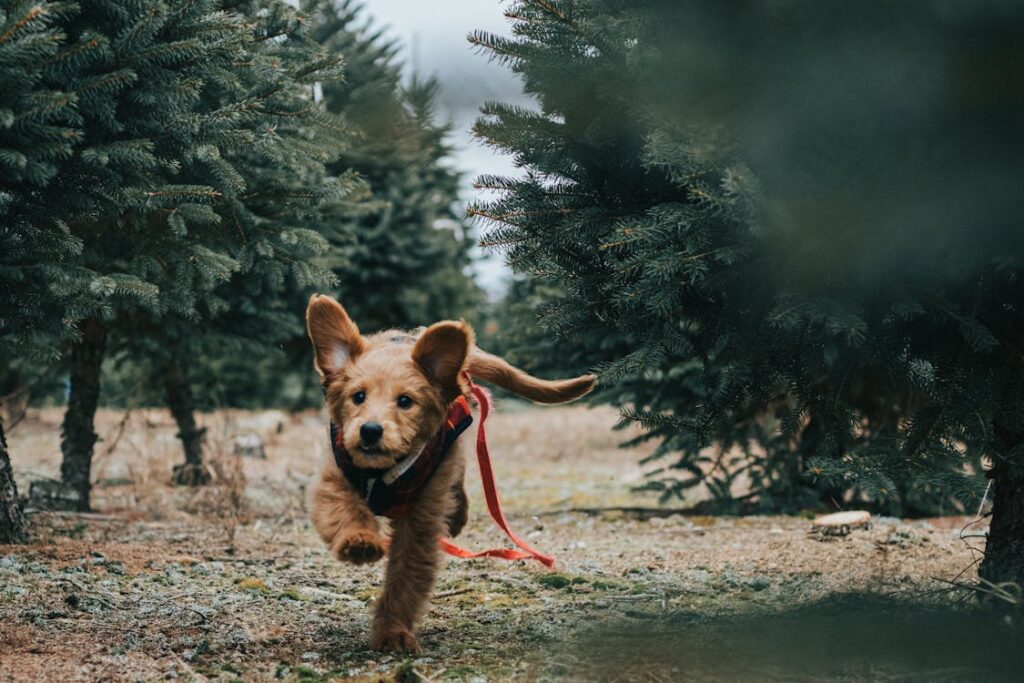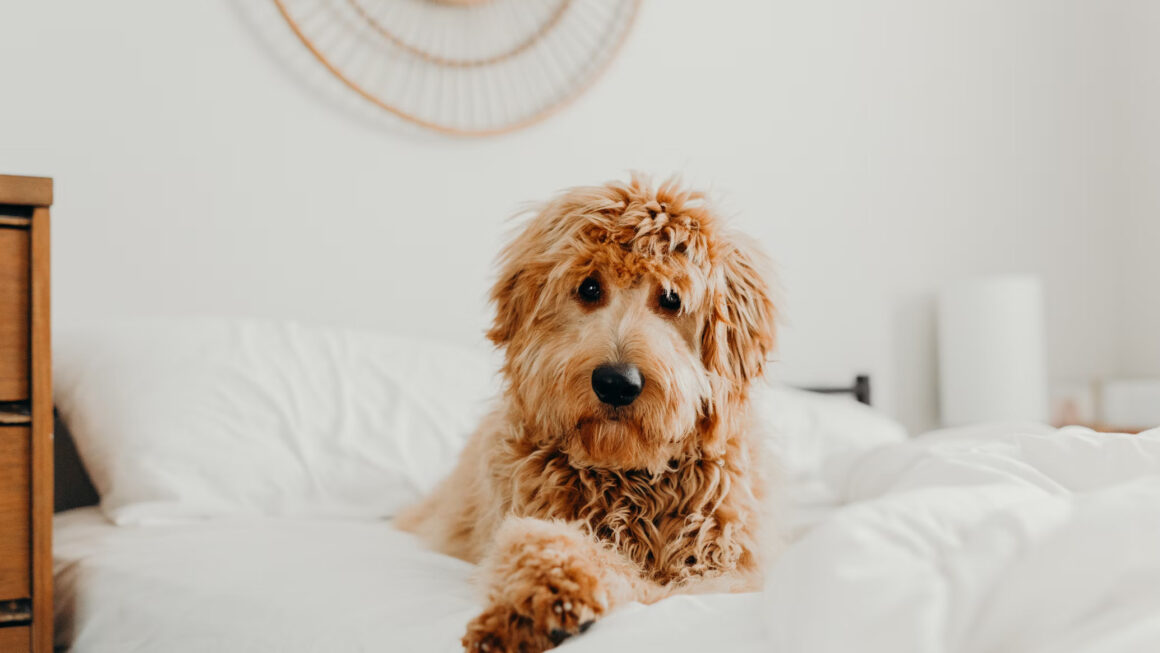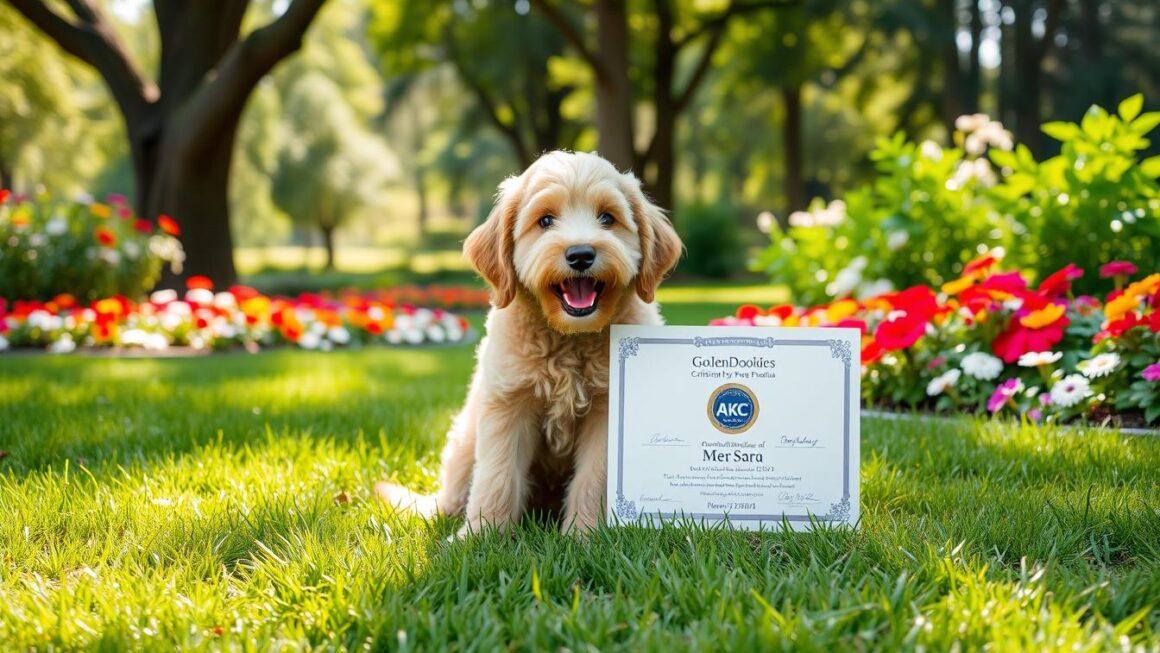Goldendoodle puppies, a delightful hybrid of the Golden Retriever and Poodle have captured the hearts of many with their charming demeanor and striking features. Renowned for their intelligence and hypoallergenic coats, Goldendoodles come in various sizes, making them a perfect fit for diverse households.
They thrive on human interaction and are ideal for families with children, first-time dog owners, or individuals needing emotional support animals. In this guide, we’ll explore everything you need to know about Goldendoodle puppies, from their care requirements to their loving temperament, ensuring you’re fully prepared to welcome one into your home.
A Brief Background on Goldendoodle Puppies

The Goldendoodle, a harmonious blend of a Poodle and a Golden Retriever, is a designer breed that first emerged in the 1960s. However, it wasn’t until the 1990s that it gained significant popularity as a distinct hybrid, following the success of the Labradoodle. This rise in prominence can be attributed to their appealing characteristics, which combine the best traits of both parent breeds.
Goldendoodle puppies were initially bred to be hypoallergenic guide dogs—a purpose they serve exceptionally well due to the non-shedding coat inherited from their Poodle ancestors. Over the years, breeders have experimented with various Poodle sizes, resulting in Goldendoodles varying in color and stature, from petite miniatures to robust standards. Today, they are celebrated for their utility, outstanding companionship and adaptability, making them beloved pets in households worldwide. Their continued popularity underscores a legacy of affection, intelligence, and ease of training that appeals to dog lovers everywhere.
Goldendoodle: Appearance and Physical Traits

Goldendoodle puppies boast a variety of stunning appearances that reflect their Golden Retriever and Poodle lineage. These charming dogs can range in size significantly, primarily influenced by the type of Poodle in their ancestry. Standard Goldendoodles, derived from standard-sized Poodles, often reach more than 21 inches in height and can weigh up to 100 pounds. In contrast, miniature Goldendoodles, bred from miniature Poodles, typically weigh no more than 35 pounds and stand 14–17 inches tall.
The coat of a Goldendoodle is another striking feature, showcasing a range of colors from the classic golden to black, white, cream, and sometimes even unique shades like grey or multicolored, thanks to the diverse gene pool of the Poodle. These dogs can have curly coats resembling their Poodle relatives or a Golden Retriever’s wavier, softer fur. Regardless of the type, their coats are famously low-shedding, making them a favored choice for individuals with allergies.
Goldendoodles’ most common eye color is brown, which adds to their warm and inviting expression. This combination of traits makes them aesthetically pleasing and contributes to their reputation as adaptable, family-friendly pets that are both beautiful and functional in various living environments.
Goldendoodle Temperament and Behavior

Goldendoodles are celebrated for their agreeable and affectionate temperament, inheriting some of the best qualities from both parent breeds. The Golden Retriever contributes its well-known friendliness and devoted nature, making Goldendoodles exceptionally loving and gentle with their families. They thrive on companionship and are known to form strong, enduring bonds with their owners.
From the Poodle side, Goldendoodles inherit a sharp intelligence and an eagerness to please, which makes them highly trainable and a favorite for various roles, including therapy and assistance dogs. Contrary to the Poodle’s sometimes misunderstood reputation as aloof, they are spirited and loyal companions, qualities Goldendoodles often exhibit.
These hybrids are also remarkably adaptable, fitting well into various family settings and living situations. They get along splendidly with children and other pets, showcasing a playful yet mild-mannered disposition. Their friendly nature means they do not enjoy being alone for long periods, preferring to be active participants in family activities. Whether it’s a game of fetch or a quiet evening at home, a Goldendoodle is happiest when in the company of their loved ones, demonstrating why they are such a popular choice for families and individuals alike.
Ideal Living Environment for Goldendoodles

When considering adding a Goldendoodle to your family, it’s crucial to consider the ideal living environment for this energetic and friendly breed. Goldendoodles are versatile and can adapt to various living situations, but they have specific needs that help them thrive.
For those considering a standard-sized Goldendoodle, a home with a spacious yard is ideal. These larger dogs benefit greatly from having room to roam and play. Regular exercise is a cornerstone of their physical and mental well-being, so access to outdoor space for games and exercise is highly beneficial.
Thanks to their smaller size, miniature Goldendoodles can be more suited to apartment living. However, they still require regular exercise and mental stimulation. Owners living in apartments should plan daily walks, dog park visits, and other activities to keep their goldendoodle active and engaged. Regardless of size, Goldendoodles are social animals that do best when interacting regularly with their human family and other dogs.
Care of Goldendoodles

Caring for a Goldendoodle involves a combination of grooming, exercise, and regular health checks to ensure they live a long, healthy life. Here’s how you can maintain the well-being of your Goldendoodle:
- Grooming: Goldendoodles are known for their beautiful but maintenance-intensive coats. They inherit the Poodle’s hypoallergenic qualities, which means they shed less, but their fur can easily become matted. Regular brushing—at least a few times weekly—is necessary to prevent tangles and mats. Depending on their coat type, which can range from wavy to curly, professional grooming every 6-8 weeks is also recommended to keep their coat trimmed and healthy.
- Exercise: Goldendoodles are an active breed that thrives on physical activity. They require daily exercise to maintain their physical health and mental well-being. Activities like walking, running, and fetching are excellent, but Goldendoodles also excel in agility and other dog sports, which can be a fun way to bond with your pet while keeping them fit.
- Health Care: Regular veterinary check-ups are crucial to monitor the health of your Goldendoodle. Common health issues in the breed include hip dysplasia, elbow dysplasia, and allergies, so early detection and management are key. Discuss with your vet about the optimal vaccination schedule and preventive care, including routine checks for ear infections, which can be frequent due to their floppy ears.
- Nutrition: Feeding your Goldendoodle a balanced diet is essential. Choose high-quality dog food appropriate for their age, size, and activity level. Because some Goldendoodles can inherit the Golden Retriever’s tendency to overeat, monitor their food intake to prevent obesity. Fresh, clean water should always be available, and treats should be given sparingly to avoid weight gain.
Diet and Nutrition for Optimal Health

A proper diet is fundamental to the health and happiness of your Goldendoodle. To ensure your furry friend grows up healthy and strong, here are key considerations for feeding your Goldendoodle:
- Choose the Right Food: Opt for high-quality dog food that suits the nutritional needs of a Goldendoodle. Look for brands that list real meat as the first ingredient and avoid foods with excessive fillers like corn, wheat, and soy. Since goldendoodles can vary greatly in size, choose a formula appropriate for their specific age, weight, and activity level.
- Portion Control: Follow the feeding guidelines on your dog food’s label or consult your vet to determine the right amount of food. Overfeeding can lead to obesity, particularly since some Goldendoodles may inherit the Golden Retriever’s appetite for food. Feeding smaller or more frequent meals can help manage hunger and maintain energy levels throughout the day.
- Supplements: Your vet may recommend supplements depending on your Goldendoodle’s health. Fish oil, for example, can support coat health and reduce inflammation. At the same time, glucosamine can benefit joint health, particularly in larger breeds prone to hip and elbow dysplasia.
- Treats for Training: Treats are an excellent tool for training, but they should be given in moderation. Choose low-calorie, nutritious treats that provide extra benefits, such as dental chews that help clean teeth and freshen breath.
- Special Dietary Needs: Be aware of any special dietary requirements or allergies your Goldendoodle may have. Some Goldendoodles may develop food sensitivities or allergies, so it’s important to monitor their reaction to new foods and consult a vet if you notice symptoms like itching, digestive upset, or ear infections.
- Fresh Water: Always provide plenty of fresh, clean water. Proper hydration is crucial for your dog’s overall health and helps aid digestion and nutrient absorption.
Training and Socialization
Training and socialization are pivotal for your Goldendoodle’s development into a well-behaved and friendly pet. Here’s how you can effectively train and socialize your Goldendoodle puppies:
- Start Early: Begin training and socialization as soon as your puppy arrives. Goldendoodles are quick learners thanks to their intelligent and eager-to-please nature. Early training lays the foundation for good behavior and helps prevent undesirable habits from forming.
- Positive Reinforcement: Use positive reinforcement techniques such as treats, praise, and play to encourage good behavior. Goldendoodles respond well to this method, as harsh techniques often lead to fear and mistrust.
- Basic Commands: Teach basic commands like sit, stay, come, and down. These improve daily interactions and ensure your dog’s safety in various situations.
- Socialization: Expose your Goldendoodle to various people, pets, and environments. Socialization helps them become well-adjusted and less fearful of new experiences. Regular visits to parks, puppy classes, and friendly gatherings allow them to interact and learn social cues from other dogs and humans.
- Consistency is Key: Consistency in training and commands helps your Goldendoodle understand what is expected of them. Establish feeding, walking, and bedtime routines to help your puppy feel secure and manage its behavior more easily.
- Handling and Grooming: Accustom your Goldendoodle to being handled and groomed from a young age. Regular handling of paws, ears, and mouth can make veterinary visits and grooming sessions much easier as they age.
- Ongoing Training: Training doesn’t end with puppyhood. Continue training throughout your Goldendoodle’s life to keep their skills sharp and engage their active minds. Advanced training classes, new tricks, and dog sports can provide great mental stimulation and bonding opportunities.
Purchasing Goldendoodle Puppies
Choosing the right breeder is crucial When adding a Goldendoodle to your family. Here are steps to ensure you bring home a healthy, happy puppy:
- Research Breeders: Look for breeders who are well-regarded for their ethics and practices. Good breeders prioritize the health, temperament, and welfare of their puppies.
- Health Testing: Responsible breeders will provide health clearances for both parent dogs. These tests screen for common genetic issues like hip dysplasia and eye conditions, reducing your puppy’s risk of health problems.
- Visit the Breeder: If possible, visit the breeder’s facility. This lets you see how the puppies are raised and interact with the litter and their parents. Good signs are a clean, spacious environment and well-socialized, healthy-looking adult dogs.
- Ask Questions: Don’t hesitate to ask the breeder about their breeding practices, the puppy’s health history, and the return policy if health issues arise.
- Adoption Considerations: Adoption is another great way to find a Goldendoodle. Many rescue organizations and shelters have Goldendoodles looking for forever homes. Adopting can be a rewarding experience and gives a dog a second chance at a happy life.
- Cost: Be prepared for the financial commitment. Goldendoodle puppies can cost between $1,000 and $4,000, depending on their lineage and the breeder’s reputation.
Conclusion
Goldendoodles are wonderful companions known for their intelligence, affectionate nature, and hypoallergenic coats. They fit well into various households, adore being part of the family, and generally get along splendidly with children and other pets. However, they require regular grooming plenty of exercise, and thrive on social interaction and mental stimulation.
Before deciding, consider whether you can provide a loving home that meets all their needs. Consider your living situation, your ability to handle their energy levels and grooming needs, and the time you can dedicate to training and socialization.
If you’re ready for the commitment, a Goldendoodle could be the perfect addition to your family, bringing joy and much love into your home.
FAQs
What is a good price for a Goldendoodle?
The cost of a Goldendoodle puppy can vary widely based on factors such as breeder reputation, location, and lineage. Typically, prices range from $1,000 to $4,000. It’s important to prioritize finding a reputable breeder who conducts health screenings and provides a supportive environment for their puppies over seeking the lowest price.
How big do Goldendoodle puppies get?
Goldendoodles come in various sizes, primarily depending on the Poodle parent’s size. Standard Goldendoodles can weigh up to 100 pounds and stand over 21 inches tall, while miniature versions typically weigh no more than 35 pounds and stand between 14–17 inches tall.
What is special about Goldendoodles?
Goldendoodles are cherished for their intelligence, friendly nature, and low-shedding, hypoallergenic coats, making them excellent companions for families with allergies. They combine the gentle, easygoing temperament of Golden Retrievers with the smart, allergy-friendly characteristics of Poodles.
Why are Goldendoodle puppies so hyper?
Goldendoodle puppies often exhibit high energy levels due to their lineage. Both parent breeds, Golden Retrievers and Poodles, are known for their active and playful nature. Regular exercise and mental stimulation are crucial to managing their energy positively.
What diseases are Goldendoodles prone to?
Goldendoodles may inherit health issues common to Golden Retrievers and Poodles, including hip dysplasia, elbow dysplasia, cardiac issues, and allergies. Responsible breeding practices and regular veterinary check-ups help mitigate these risks, ensuring your Goldendoodle stays healthy and happy.





2 thoughts on “Goldendoodle Puppies: Everything You Need to Know”